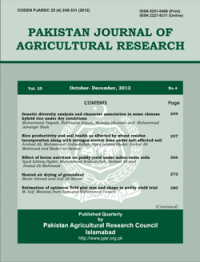GENETIC DIVERSITY IN UPLAND COTTON FOR COTTON LEAF CURL VIRUS DISEASE, EARLINESS AND FIBER QUALITY
Frasat Saeed*, Jehanzeb Farooq*, Abid Mahmood**, Tassawar Hussain***, Muhammad Riaz* and Saghir Ahmad****
ABSTRACT
In Pakistan during last two decades the major factor limiting cotton production is cotton leaf curl virus disease (CLCuD). For estimation of genetic diversity regarding CLCuD tolerance, fiber quality and some yield contributing traits, 101 cotton genotypes imported from USA were evaluated. Different statistical procedures like cluster, principle components (PC) and correlation analysis were employed to identify the suitable genotypes that can be further exploited in breeding programme. Significant associations were found between yield contributing trait, boll weight and fiber related trait, staple length. Earliness related traits, like st st days taken to 1 square and days taken to 1 flower had positive correlation with each other and both these traits also showed their positive association with ginning out turn. The negative significant correlation of CLCuD was obtained with monopodial branches, sympodial branches and plant height. Principal component (PC) analysis showed first five PCs having eigen value >1 explaining 67.8% of the total variation with days to st -1 1 square and flowering along with plant height and sympodia plant which were being the most important characters in PC1. Cluster analysis classified 101 accessions into five divergent groups. The genotypes in st cluster 1 only showed reasonable values for days to 1 square and flower, sympodia per plant, ginning out turn, staple length and fiber fineness and the genotypes in cluster 5 showed promising values for the traits like cotton leaf curl virus, ginning out turn and fiber fineness. The genotypes in cluster 1 and 5 may be combined to obtain desirable traits related to earliness and better disease tolerance. Scatter plot and tree diagrams demonstrated sufficient diversity among the cotton accessions for various traits and some extent of association between various clusters. It is concluded that diversity among the genotypes could be utilized for the development of CLCuD resistant lines with increased seed cotton and lint yields with desirable fiber quality.
To share on other social networks, click on any share button. What are these?






